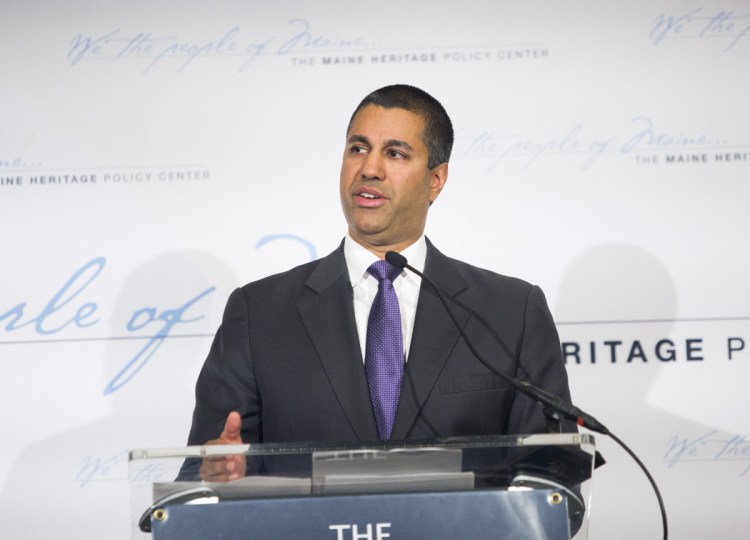Federal Communications Commission Chairman Ajit Pai defended his decision to repeal net neutrality regulations and stressed the importance of expanding broadband internet service in rural areas Friday before a packed audience of conservatives in Portland.
Pai visited Maine as part of a New England road tour that also included Vermont, New Hampshire and Connecticut. He was the keynote speaker at a fundraiser hosted by the Maine Heritage Policy Center, a free-market policy think tank.
Pai framed his speech around a series of quotes from “The Shawshank Redemption,” the 1994 prison drama adapted from a Stephen King short story that takes place in a fictionalized version of Maine.
“We are not as divided as cable news or Twitter would have you believe,” Pai said. “And given that we’re in Maine, I can’t help but think of one thing that I think really all Americans agree on, or should, at least: That is the greatest (movie), ‘The Shawshank Redemption.’ “
He described to the audience of more than 250 attendees how advancements in technology have rapidly changed Americans’ lives, quoting a character from the movie who, after decades of incarceration, was released into a world he could no longer comprehend.
Pai talked about the many opportunities internet access has created and said he believes the role of government should be to step back and allow private sector innovation to flourish without regulatory interference.
“As Red once said of Andy, ‘Some birds weren’t meant to be caged,’ ” Pai said, again referencing characters from the movie.
‘LIGHT-TOUCH REGULATION’
In December, the FCC voted to repeal Obama-era “net neutrality” rules, giving internet service providers such as Verizon, Spectrum and Xfinity a free hand to slow or block websites and apps as they see fit, or charge more to push certain content at faster speeds. In a straight party-line vote of 3-2, the Republican-controlled FCC jettisoned the principle that all web traffic must be treated equally.
The move to eliminate net neutrality has stirred fears among consumer advocates, Democrats, online content providers and consumers who fear that the cable and phone giants will be able to control what people see and do online. But the broadband industry has promised that the internet experience for the public isn’t going to change.
Pai characterized the repeal as a return to the principle of “light-touch regulation” that he said had prevailed prior to the implementation of net neutrality rules in 2015.
“I believe in a free and open internet,” he said. “That is what has given America an internet economy that is the envy of the world, and that internet economy grew and thrived under a light-touch regulatory regime that started with a bipartisan agreement between President Clinton and a Republican Congress in 1996, which was to have an internet that was ‘unfettered by federal and state regulation.’ “
In 2015, a Democratic majority of the FCC abandoned that successful approach, Pai said. The result was that internet service providers scaled back their investments in new infrastructure, prompting the need for a repeal of net neutrality rules, he said.
“The internet wasn’t broken,” Pai said. “We were not living in some digital hellscape in 2015, but the FCC decided to impose heavy-handed rules to fix it anyway.”
REACHING RURAL CUSTOMERS
Pai also talked about the importance of bringing broadband internet access to rural areas. He said broadband is an important tool for businesses, schools and individuals because it connects people, brings essential services such as telemedicine and spurs economic growth.
However, many rural areas still don’t have access to broadband and are being left behind in various ways as a result, Pai said.
“There is a real digital divide in this country, a gap between those who have access to the internet and those who don’t,” he said. “I know what that gap is like. … I grew up in rural Kansas, where countless towns are on the wrong side of the digital divide.”
Pai said that under his leadership, the FCC is experimenting with new ways to spur investment in rural broadband infrastructure, such as awarding $1.5 billion in grants to internet service providers via a “reverse auction” process in which companies submit competing bids for rural broadband projects.
One such company, Viasat Inc. of Carlsbad, California, recently was awarded a $4.7 million grant to provide internet service to about 4,100 homes in rural Maine.
Maine Heritage Policy Center CEO Matthew Gagnon said net neutrality is “one of the most crucial public affairs issues facing our country.” He praised Pai for his decision to scale back regulations and said the move already has produced positive results in the form of boosted investment in broadband infrastructure.
“We have already seen the wisdom of that decision playing out right now,” Gagnon said.
J. Craig Anderson can be contacted at 791-6390 or at:
Twitter: jcraiganderson
Send questions/comments to the editors.




Success. Please wait for the page to reload. If the page does not reload within 5 seconds, please refresh the page.
Enter your email and password to access comments.
Hi, to comment on stories you must . This profile is in addition to your subscription and website login.
Already have a commenting profile? .
Invalid username/password.
Please check your email to confirm and complete your registration.
Only subscribers are eligible to post comments. Please subscribe or login first for digital access. Here’s why.
Use the form below to reset your password. When you've submitted your account email, we will send an email with a reset code.